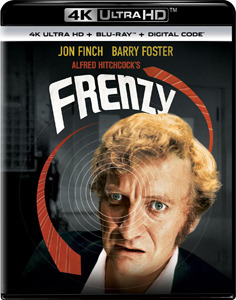“Frenzy” (1972) is Alfred Hitchcock’s best British film – even though it’s his only British film after he switched to Hollywood, and it’s from his maligned late-career period. Like a lot of his films that aren’t about international issues, “Frenzy” could take place anywhere – even though it’s based on Arthur La Bern’s novel “Goodbye Piccadilly, Farewell Leicester Square” – although I do enjoy the London flavor.
The Hitchcock procedure
By now, Hitchcock had gotten so good at films about frame-jobs, narrow-minded cops and innocent men on the run that you can see the storyboarding process even as you watch the finished film – but that’s more of a perk than a bug. With “Frenzy,” he picks strong source material and writer Anthony Shaffer (whose career was sparse but brilliant, including “The Wicker Man” and several of Peter Ustinov’s Poirot movies) extracts stellar suspense sequences.
“Frenzy” is gripping without making the slightest effort to have characters be likeable. Shaffer and Hitch hook our sympathies to people because of their situation (not their qualities as a human being), and that makes “Frenzy” engrossing.

“Frenzy” (1972)
Director: Alfred Hitchcock
Writers: Anthony Shaffer (screenplay), Arthur La Bern (novel)
Stars: Jon Finch, Barry Foster, Barbara Leigh-Hunt
Making it very different from Twenties and Thirties British productions, we’re now in an age of less censorship, with the UK being fine with nudity although not so much with violence. But Hitch’s masterful ability to suggest things without outright showing them – combined with great acting – makes for a harrowing rape scene.
Later, when the Necktie Strangler (specifics to come after the spoiling warning) is searching a nude corpse for a clue that could incriminate him in the back of a hurtling potato truck, I get a sense of macabre humor. Same with the quick shots of dead victims’ faces, with their tongues sticking out after being strangled.
Elevating the humor are dry comedy sequences featuring the one smart cop, Alec McCowen’s Chief Inspector Oxford. His wife (the brilliant Vivien Merchant) loves exotic cooking but is terrible at it, and oblivious that her husband hates her meals. OK, so maybe those two are likeable, in the sense that they are the comic relief from the drama.
We always want them to get away
But later, the potato-truck sequence is proof that — in the art of suspense — it absolutely does not matter whether we like the person who is in the tense situation. Because the Necktie Strangler is the protagonist for the moment, we are in his shoes and want him to get away.
That having been said, when we pull out to the wider narrative, we want the bad guy to be caught, and the good guy to have a happy ending.

As for who is good and who is bad, Hitchcock and Shaffer play with this in the slow but intriguing-enough first act. (SPOILERS through end of post.) Jon Finch’s Richard Blaney is a brash screw-up, getting fired from his bartender job for stealing (although there’s ambiguity about his guilt, and his boss is a jerk). Barry Foster’s Robert Rusk is seemingly an above-board produce salesman who gives Blaney a good horse-racing tip and sympathizes with his job loss.
Once Rusk is revealed as the Strangler in a well-staged, grotesque rape sequence co-starring Barbara Leigh-Hunt, we’re into a frenzy of the hero’s and villain’s separate yet intertwined actions. It leads to a brilliant frame-job sequence, because it’s sharp thinking in the moment for Rusk to frame Blaney, but in the long run it’s risky because it only requires the cops to listen to Blaney (who knows precisely how he was framed).
By the end, “Frenzy” has created a pile of possibilities, and it’s like the last 50 pages of an Agatha Christie book; we can’t turn away. But this isn’t a whodunit or precisely a howcatchem, it’s a “what the hell is gonna happen?”
Tied up nicely
Shaffer and Hitchcock decide to end things tidily and abruptly with a great closer (“Mr. Rusk, you’re not wearing your tie”), which I don’t mind. But things could’ve gone many ways, and the brilliance of the screenplay is that these possibilities have taken up residence in viewers’ heads.
For example, I love the ironic idea that Rusk – who had so desperately retrieved his monogrammed pin from a corpse’s fingers in the potato truck – has left behind part of his pocketknife. Maybe that could be matched up with the other half.
And fascinating legal issues percolate. The authorities now know Blaney is innocent, but does he face any consequences for breaking out of prison before he’s officially set free? And would he face any consequences if he killed Rusk, who had framed him and who is continuing to kill women?
The answer to both questions is likely yes, and ultimately I’m glad the film doesn’t go there, because the straightforward ending is satisfying. But it’s a testament to the movie’s richness that it sends our minds down so many paths not taken.
It’s a slight knock against “Frenzy” that its interest in the nature of psychotic individuals is skin-deep, rather than the genuine explorations of “Spellbound” and “Psycho.” But certainly, the 72-year-old Hitch brings his A-game of suspenseful plotting and macabre fun back home.
RFMC’s Alfred Hitchcock series reviews works by the Master of Suspense, plus remakes and source material. Click here to visit our Hitchcock Zone.

